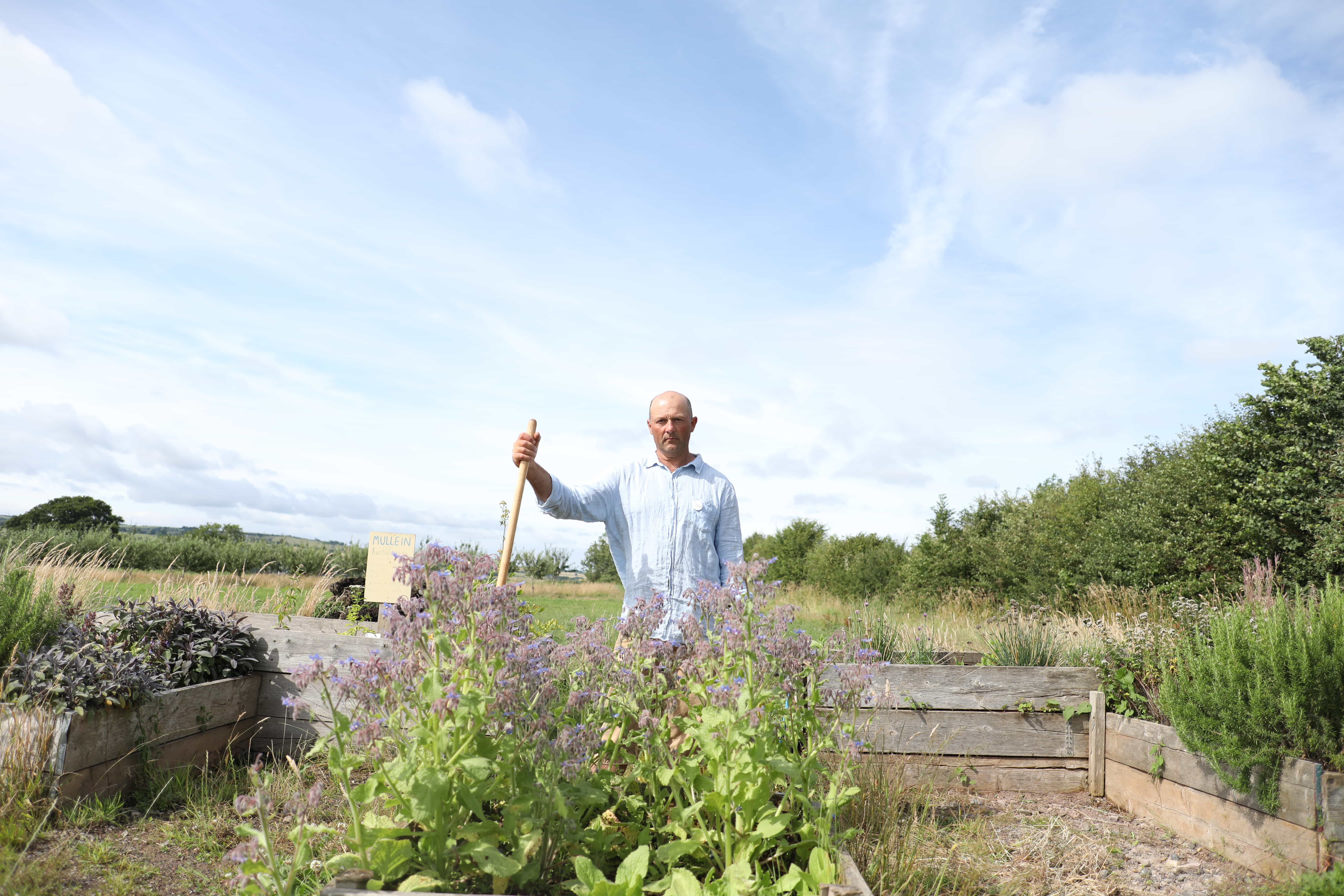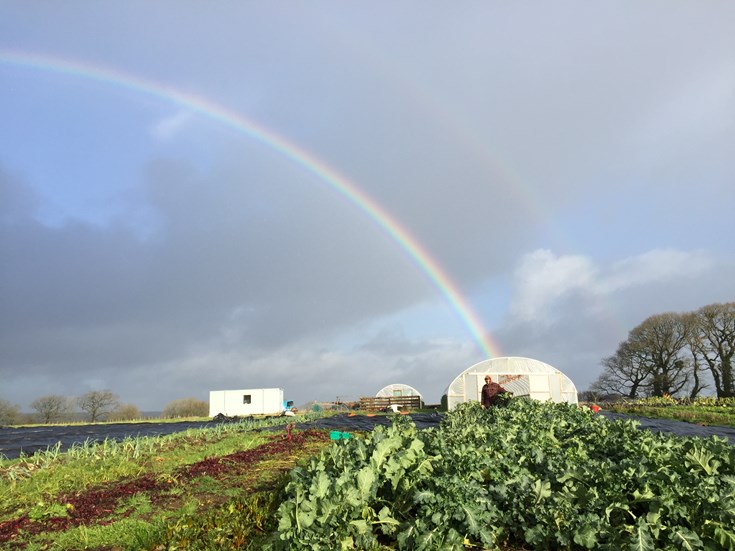
- Soil Association
- Take action
- Organic living
- Why organic?

Why organic?
The way we farm and eat can make a world of difference. Organic is an agroecological farming system that offers many benefits.
- It's better for the planet
- It has higher animal welfare standards
- It's better for wildlife
- It's better for people
By opting for organic next time you shop, you’re helping support a way of farming that:
1. Is better for the planet
Designed to respect nature and to enhance the health of soils, water and air, organic farming is leading the way on sustainability.
In fact, if Europe’s farmland all followed organic principles, agricultural emissions could drop by 40-50% by 2050, with plenty to feed the growing population healthy diets.
Organic farmers are encouraged to ‘close the loop' on their farms, making use of what’s to hand and limiting the use of imported resources.
This means:
-
No artificial fertilisers
Organic farming lowers the risk of environmental pollution and helps reduce greenhouse gas emissions by severely restricting the use of manufactured chemical fertilisers and pesticides, which come from burning fossil fuels.
Instead, organic farmers must use build fertile soils naturally, using compost and manure (often sourced from their own farm or local herds), and rotate their crops to keep soils healthy.
Synthetic nitrogen fertilisers are also responsible for an increase in nitrous oxide in the atmosphere, a greenhouse gas which is 300 times more potent than carbon dioxide.

-
Healthier soils, that store more carbon
Soil is one of our most important tools in the fight against climate change. There are 2,500 billion tonnes of carbon stored in the world’s soils! That’s more than in the plants, trees and the atmosphere combined.
Organic farming creates healthy, living soils by nourishing them with compost, nitrogen-fixing crops, and crop rotations. Long term studies have shown that when comparing organic and conventional farming systems, soils in organic farms store more carbon and have higher levels of soil microorganisms.
Organic farmers must build fertile soils naturally. They use compost and manure (often sourced from their own farm or local herds), and rotate their crops to keep soils healthy.

-
Meat that's more environmentally friendly
Meat and climate change are regularly in the headlines together, but eating less and better meat from nature-friendly organic farms can offer a sustainable alternative that’s better for the planet.
Grazing animals have an important role to play in the ‘closed loop’ approach of organic farming; making use of what’s to hand and limiting the use of imported resources:
1. They reduce the need for chemical fertilisers: As they graze, animals fertilise the soil by spreading their manure. This feeds nutrients to the plants and organisms in the soil, improving soil health, and removing the need for energy intensive fertilisers.
2. Well-managed grazing cattle can also capture carbon, by improving fertility in soils and increasing grassland’s ability to absorb carbon dioxide from the atmosphere.
3. Less imported animal feed: Unlike non-organic systems, organic farmers are not allowed to feed livestock on imported GM-feeds.
Organic cows eat mainly grass (the organic standard requires a minimum 60% forage, such as grass, legumes and silage, in their diet), and the diet of organic animals must be primarily sourced from the same farm, or other regional organic farms.
2. Has higher welfare for farm animals
Ensuring all animals reared for meat and animal products have a good life is at the heart of Soil Association standards.
Organic farming has the highest animal welfare standards of any international farming system; this means truly-free range animals, encouraged to forage, graze and roam, with plenty of space, fresh air, and conditions that allow them to express their natural behaviours.

Smaller flocks and herds, and more access to the outdoors means organic animals don’t have to be routinely treated with antibiotics and wormers, and mutilations like beak-tipping to prevent the aggressive side effects of stress are also not needed, or allowed.
3. Is better for nature and wildlife
41% of Britain’s wildlife species have declined since 1970, and more than 1 in 10 are currently facing extinction. Intensive farming practices, especially pesticide use, have been identified as the main driver of these declines, but organic farming offers an alternative.
Organic farms are havens for wildlife and provide homes for bees, birds and butterflies. Organic farms have on average 30% more biodiversity.
Organic farmers use fewer pesticides
And only under very restricted circumstances. Organic farmers rely on a whole ecosystem to keep pests under control, where animals like beetles and birds feed on pests such as aphids and slugs.
If pesticides were substituted for more sustainable farming practices like organic, this could slow or reverse the decline in insects!
Land use on organic farms is more nature-friendly
Did you know? For every 10% increase in bee-friendly habitats - like that found on organic farms - bee numbers and diversity increases by over a third!
Because organic farmers rely on healthy ecosystems to control pests and protect their soils, they tend to farm in a way that encourages wildlife, like planting trees, ‘beetle banks’ and wildflower margins, and digging ponds around their fields. This means organic farms are more ecologically diverse.
Organic farming supports cleaner water for wildlife
The nitrogen fertilisers used in conventional farming can create ‘ocean dead zones’ which deprive life below water of vital oxygen. This can kill fish and other aquatic life. Organic standards ban the use of these manufactured fertilisers, lowering the risk of pollution in rivers, seas and waterways.

4. And is better for People
You might be asking yourself if organic food is safer than conventional products.
Organic farming joins the dots between our own health and the health of our planet, our animals and our wildlife:
- Fewer pesticides
- Fewer additives and preservatives
- No GM ingredients
- Reduced use of antibiotics
- More resilient farms
- Nutritionally different food
Eating organic food means supporting a way of farming that works for people long into the future – from farmers out in the fields to those tucking in at home.
The health of soil, plant, animal and man is one and indivisibleAlbert Howard
For a food product to be labelled as organic, every step in the supply chain, from farmers and packers to food processors and shops that sell organic products, must meet organic standards and prove it to an organic certification body, like Soil Association Certification.
Soil Association Certification certify over 70% of organic food in the UK, meaning that wherever you see the organic symbol, you can be sure that you're buying:
Food that contains fewer pesticidesThe best way to reduce your exposure to pesticides in food is to buy organic. Certified organic food, including fruit and vegetables, processed food and meat and dairy products will, overall, contain less pesticides.
As mentioned above, pesticides are named as a key driver of insect and pollinator decline. Three quarters of our food crops depend on pollinators, and without them, we wouldn’t have some of our favourite, and most nutritious foods, like potatoes, strawberries, tomatoes, coffee, chocolate!
Fewer additives and preservativesThe use of additives and processing aids is heavily restricted in organic. Organic standards prohibit:
- Hydrogenated fats
- Controversial artificial food colourings, sweeteners and preservatives, like tartrazine and aspartame
- And prevent organic fruit and vegetables from being washed in chlorine
No GM ingredientsOrganic food systems are opposed to GM, for environmental, health and social reasons, and all GM ingredients are banned under organic standards.
Their limited capability, plus the high cost of producing a commercial GM crop or animal, means that the technology is often targeted at profitable, but short-term fixes that don’t address root causes.
Organic systems work to find solutions to underlying causes rather than symptoms. For example, rather than tweaking a gene in livestock for short-term disease resistance, organic farming aims to reduce the likelihood of disease in the first place, usually through higher welfare standards.
Whilst GM foods are very limited in the UK, most non-organic livestock are fed them. As such GM-fed meat, egg and dairy is widespread and unlabelled in supermarkets.
Food produced using fewer antibioticsThe overuse of antibiotics in human and animal medicine is undermining their ability to cure life-threatening infections. The more sparingly we use our antibiotics, the more effective they will remain.
With farm animals accounting for 30% of all antibiotics used in the UK, organic farming standards, which ban the routine use of antibiotics, can help minimise antimicrobial resistance and protect the effectiveness of these treatments.
Food from more resilient farmsIn the face of changing weather patterns on a warming planet, organic farms are more resilient to the effects of climate change; soils on organic farms store up to twice as much water, helping to protect against flooding, and performing better during drought.
What’s more, because organic farms are more diverse, using methods like agroforestry to grow other crops, organic farmers are less dependent on the success of a single crop, offering alternatives in the event of crop failures or volatile markets.

Producing food that's nutritionally different
The hard work organic farmers put into caring for their crops and animals pays off in the quality of the food they produce. Research has found significant nutritional differences between organic and non-organic farming:
- A study published in the British Journal of Nutrition in 2014 showed that organic milk and meat contain around 50% more beneficial omega-3 fatty acids than non-organic. These nutritional differences also apply to organic dairy like butter, cream, cheese and yoghurt.
- The difference in Omega 3 is because organic animals eat a more natural, grass-based diet, containing high levels of clover, which is used to fix nitrogen on organic farms, replacing chemical fertiliser.
- Organic meat had slightly lower concentrations of two saturated fats, and organic milk and dairy were found to contain slightly higher concentrations of iron, Vitamin E and some carotenoids.
- What's more, organically produced crops (cereals, fruit and vegetables) were found with up to 68% more antioxidants than non-organic, whilst organic fruit and veg contained lower concentrations of pesticides and the toxic heavy metal cadmium.
-
Become a member
Join the community of thousands fighting to transform food and farming - we must act now to protect our health, our natural world, and our climate.
Join us

